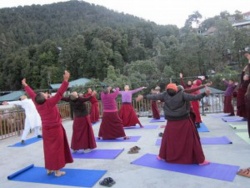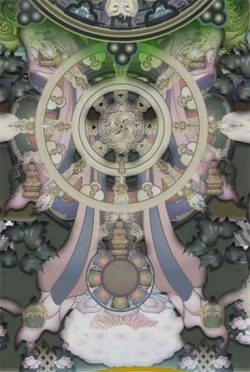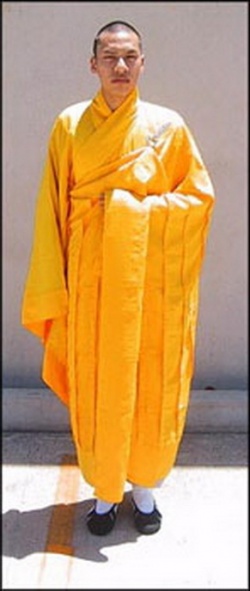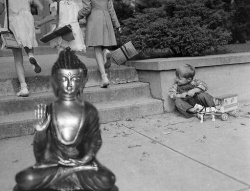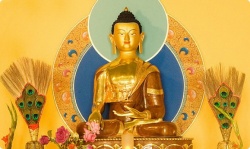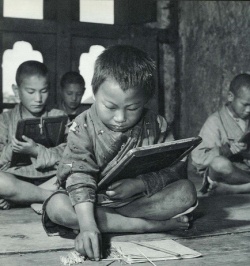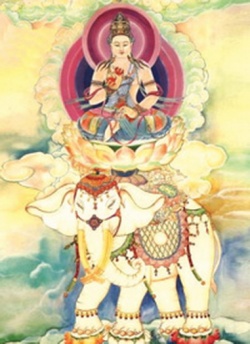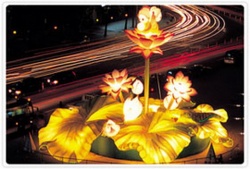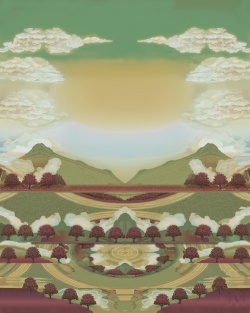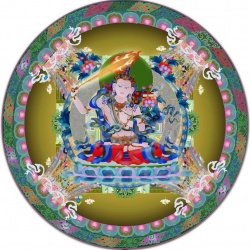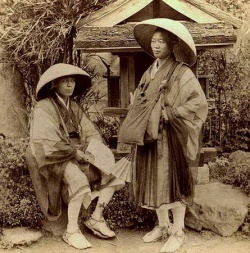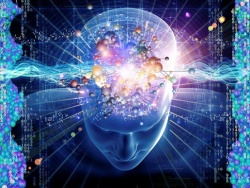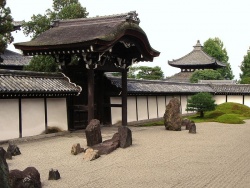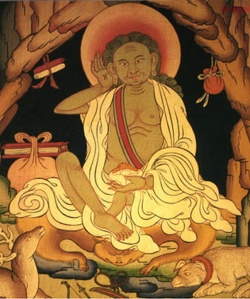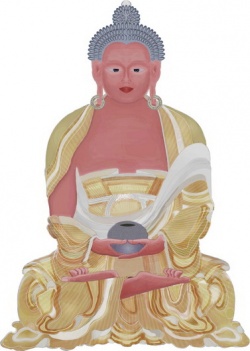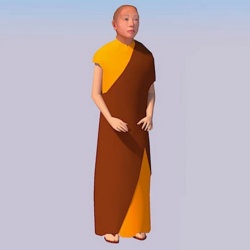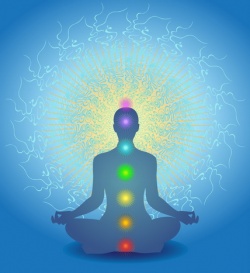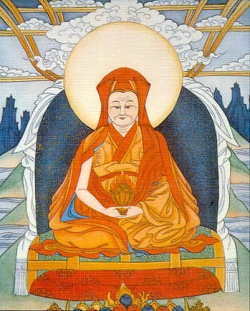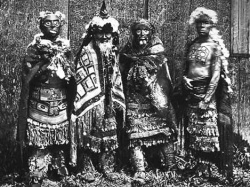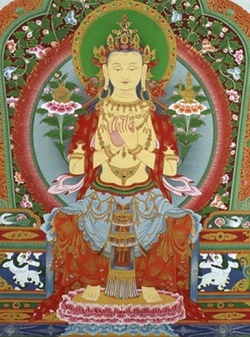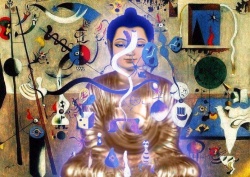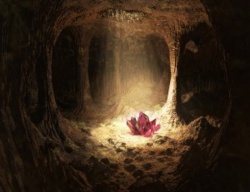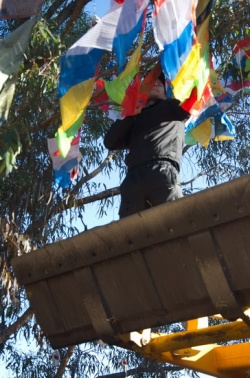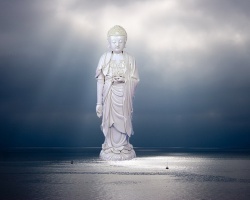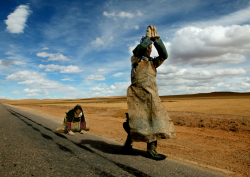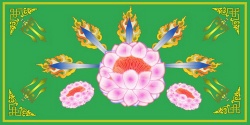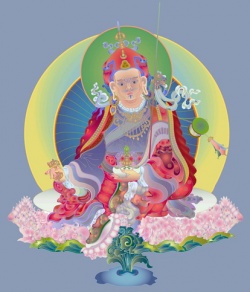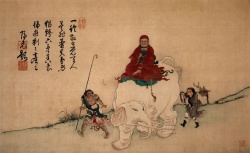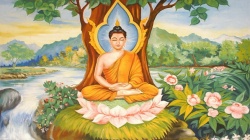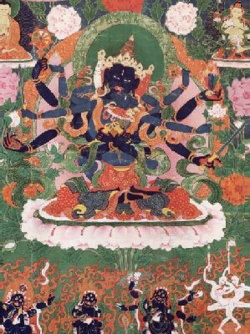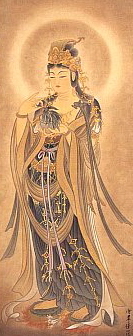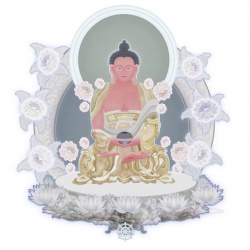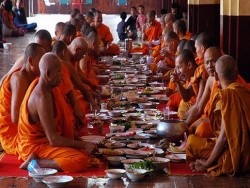Utpadyananirudhyanasūtram: The Discourse on Arising and Ceasing (The Fourth Discourse of the Buddha)
Utpadyananirudhyanasūtram[1]
The Discourse on Arising and Ceasing
(The Fourth Discourse of the Buddha)
(from Mahāvastu Vol. III, pp. 443-9)
Edited by
Emile Senart
and Translated by
Ānandajoti Bhikkhu
(Expanded edition August 2009/2553)
Acknowledgement
I am very grateful indeed to Rod Bucknell who kindly went through the whole work for me and made a number of useful suggestions and corrections especially in regard to some of the more obscure passages of this discourse.
Introduction[2]
Atha khalu Bhagavāṁ Magadheṣu cārikāṁ caramāṇo
Then the Gracious One while walking on walking tour amongst the Magadhans
mahatā Bhikṣusaṁghena sārdham-ardhatrayodaśabhir-bhikṣuśataiḥ,
with a great Community of Monks, with one thousand two hundred and fifty monks,
yena Magadhānāṁ Rājagṛhaṁ nagaraṁ tad-anusāri,
entered the town of Rājagṛha of the Magadhans,
tad-anuprāpto tatraiva viharati antagirismiṁ Yaṣṭīvane udyāne.
and having reached there he lived in the Sapling garden wood on the edge of the mountain.
Aśroṣīd-Rājā Śreṇiyo Bimbisāro brāhmaṇasya purohitasya Rājācāryasya:
King Śreṇiya Bimbisāra heard from his brāhmaṇa chaplain and royal teacher:
“Bhagavāṁ kila Magadheṣu cārikāṁ caramāṇo
“The Gracious One, it seems, while walking on walking tour amongst the Magadhans
mahatā Bhikṣusaṁghena sārdhaṁ trayodaśabhikṣuśatair-
with a great Community of Monks, with one thousand two hundred and fifty monks,
yena Magadhānāṁ Rājagṛhaṁ nagaraṁ tad-anusāri,
has entered the town of Rājagṛha of the Magadhans,
tad-anuprāptas-tatraiva viharati antagirismiṁ udyāne Yaṣṭīvane.
and having reached there he is living in the Sapling garden wood on the edge of the mountain.”
Śrutvā punaḥ anyataraṁ Rājāmātyam-āmantrayasi:
After hearing (it) he addressed a certain King's Minister (saying):
“Bho bhaṇe Amātya Bhagavato Buddhasya pratyudgamanaṁ gamiṣyāmi.
“Good Minister, I am going out to meet the Gracious One, the Awakened One.
Rājagṛhaṁ alaṁkārāpehi bhadrāṇi ca yānāni yojāpehi
Decorate Rājagṛha, and prepare magnificent vehicles
sarvehi ca Rājagṛhakehi brāhmaṇagṛhapatikehi,
for the brāhmaṇas and householders from Magadha,
sarvehi ca śilpāyatanehi sarvehi ca śreṇīhi,
and all the craftsmen, and all the guildsmen,
mayā saha Bhagavato Buddhasya pratyudgamanaṁ gantavyan.”-ti
they must go together with me to meet the Gracious One, the Awakened One.”
“Sādhu Mahārāja” tti sa Rājāmātyo Śreṇyasya Biṁbisārasya pratiśrutvā,
“Certainly, Great King”, said the King's Minister, and after agreeing with Śreṇya Bimbisāra,
kṣipram-eva bhadrāṇi yānāni yojāpesi,
he quickly prepared the magnificent vehicles,
Rājagṛhe ghoṣaṇāṁ kārāpesi catvaraśṛṁgāṭaka-antarāpaṇamukheṣu:
and had this proclamation made in Rājagṛha at the cross-roads and entrances (to the town):
“Buddho Bhagavāṁ Rājagṛhe antagirismiṁ Yaṣṭīvanaṁ udyānaṁ samanuprāpto
“The Awakened One, the Gracious One has reached the Sapling garden wood on the mountain's edge
tatra sarvehi bhavantehi Rājñā Śreṇyena Bimbisāreṇa sārdhaṁ Bhagavato pratyudgamanaṁ gantavyaṁ.”
and everyone here must go together with King Śreṇya Bimbisāra to meet the Gracious One.”
a long paragraph describing the different classes of people
who accompanied the King is omitted here
Atha khalu sa Rājāmātyo saṁnipatitaṁ janakāyaṁ viditvā bhadrāṇi yānāni yojāpayitvā,
Then the King's Minister, after seeing that the people had assembled, the magnificent vehicles had been made ready,
yena Rājā Śreṇyo Bimbisāras-tenopasaṁkramitvā,
and approaching King Śreṇya Bimbisāra,
Rājānaṁ Śreṇiyaṁ Bimbisāram-etad-avocat:
said this to King Śreṇiya Bimbisāra:
“Yuktāni Mahārāja bhadrāṇi yānāni mahājanakāyaṁ ca sannipatitaṁ,
“The magnificent vehicles have been made ready, Great King, and a great body of people have assembled,
yasyedāni Deva kālaṁ manyasi.”
now is the time, your Majesty, for whatever you are thinking.”
Atha khalu Rājā Śreṇyo Bimbisāraḥ bhadraṁ yānam-abhiruhitvā,
Then King Śreṇya Bimbisāra, after mounting a magnificent vehicle,
Māgadhakehi brāhmaṇagṛhapatikehi sārdhaṁ dvādaśehi nayutehi saṁparivṛto,
surrounded by twelve myriads of brāhmaṇas and householders from Magadha,
mahatā Rāja-ṛddhīye mahato janakāyasya
with great Royal power and a great body of people
hakkārahikkārabherīmṛdaṁgamarupaṭahaśaṁkhasaṁninādena,
who were calling and shouting, with the collective noise of drums great and small, and conches,
Rājagṛhāto nagarāto niryātvā yena antagirismiṁ Yaṣṭīvanam-udyānaṁ tena prayāsi.
went out from the town of Rajagṛha and to the Sapling garden wood on the edge of the mountain.
Atha khalu Rājā Śreṇyo Bimbisāro yāvad-eva yānabhūmis-tāvad-eva yānena yātvā,
Then the King Śreṇyo Bimbisāra, having gone as far as the ground for vehicles (would allow),
yānāto pratyoruhya padasā yeva yena Bhagavāṁs-tenopasaṁkramitvā,
and descending from the vehicle, approached the Gracious One by foot,
Bhagavataḥ pādau śirasā vanditvā ekānte niṣīdet,
and after worshipping the Gracious One's feet with his head, he sat down on one side,
Apy-ekatyā Bhagavatā sārdhaṁ saṁmodanīyāṁ kathāṁ saṁmodayitvā,
Some, after polite and courteous talk with the Gracious One,
sārāyaṇīyāṁ kathāṁ vyatisārayitvā ekānte niṣīdensuḥ.
and exchanging greetings, sat down on one side.
Apy-ekatyā Bhagavato svakasvakāni mātāpitṛkāni nāmagotrāṇi anuśrāvayitvā ekamante niṣīdensuḥ.
Some, after announcing to the Gracious One their very own Mother's and Father's name and lineage, sat down on one side.
Apy-ekatyā yena Bhagavāṁs-tenāṁjaliṁ praṇāmayitvā ekānte niṣīdensuḥ.
Some, after raising their hands in respectful salutation to the Gracious One, sat down on one side.
Apy-ekatyā Māgadhakā brāhmaṇagṛhapatikā tūṣṇībhūtā ekānte niṣīdensuḥ.
Some of the brāhmaṇas and householders from Magadha, while keeping silent, sat down on one side.
Tena khalu punaḥ samayena Uruvilvākāśyapo Bhagavato avidūre saṁniṣaṇṇo abhūṣi.
Then at that time Uruvilvā Kāśyapa was sat not far away from the Gracious One.
Atha khalu teṣāṁ Māgadhakānāṁ brāhmaṇagṛhapatikānām-etad-abhūṣi:
Then this occurred to those brāhmaṇas and householders from Magadha:
“Kiṁ nu khalūruvilvākāśyapo śramaṇe Gautame brahmacaryaṁ carati,
“How is it: does Uruvilvākāśyapa live the spiritual life under the ascetic Gautama,
utāho Mahāśramaṇo Gautamo Uruvilvākāśyape brahmacaryaṁ carati?”
or does the Great Ascetic Gautama live the spiritual life under Uruvilvākāśyapa?”
Atha khalu Bhagavān-teṣāṁ brāhmaṇagṛhapatikānām-idam-evarūpaṁ cetasaḥ
Then the Gracious One knowing that such a thought had arisen in the minds
parivitarkam-ājñāya āyuṣmantaṁ Uruvilvākāśyapaṁ gāthāye adhyabhāṣe:
of the brāhmaṇas and householders addressed the venerable Uruvilvākāśyapa with a verse:
- “Kim-eva dṛṣṭvā Uruvilvavāsi
- “Having seen what did you, one of Uruvilvā,
- Prahāya agniṁ kṛśako vadāno
- Who spoke of austerity, give up the sacrificial fire?
Evam ukte āyuṣmān Uruvilvākāśyapo Bhagavantaṁ gāthāye pratyabhāṣe:
When that was said the venerable Uruvilvākāśyapa replied to the Gracious One with a verse:
- “Annāni pānāni atho rasāni,
- “The sacrifices speak of food, drinks, [3]
- Kāmāṁ striyo cābhivadaṁti yajñe.
- And also tastes, sensuality, and women.
- ‘Etaṁ malan’-ti upadhīṣu jñātvā
- Having understood that in the attachments ‘this is a stain’,
- Tasmān-na yajñe na hute ramāmi.”
- I therefore take no delight in offerings and sacrifices.”
Atha khalu Bhagavān-āyuṣmantam-Uruvilvākāśyapaṁ gāthāye pratyabhāṣe:
When that was said the Gracious One replied to the venerable Uruvilvākāśyapa with a verse:
“Eteṣu tvaṁ [4] na mano akāsi “If your mind takes no delight
- Aparaṁ nu taṁ devamanuṣyăśreṣṭhaṁ
- In what other thing that is good for gods and men
Atha khalv-āyuṣmān-Uruvilvākāśyapo Bhagavantaṁ gāthāye pratyabhāṣe
When that was said venerable Uruvilvākāśyapa replied to the Gracious One with a verse:
- “Dṛṣṭvā muniṁ śāntam-anupadhīkaṁ, [5]
- “Having seen the silent saint, [6] free of attachments,
- Akiṁcanaṁ sarvabhaveṣv-asaktaṁ,
- (That) nothingness, unattached to the all realms of existence, [7]
- Ananyathābhāvam-ananyaneyaṁ,
- The Unchangeable, unknown to others,
- Tasmān-na yaṣṭe na hute ramāmi.”
- I therefore take no delight in offerings and sacrifices.”
Atha khalu Bhagavān-āyuṣmantam-Uruvilvākāśyapaṁ gāthāye pratyabhāṣe:
When that was said the Gracious One replied to the venerable Uruvilvākāśyapa with a verse: [8]
- “Mohan-te juhito agni, mohan-te so tapo kṛto,
- “Deluded you lit the fire, deluded you performed austerity,
- Yaṁ jahe paścime kāle jīrṇāṁ va urago tvacaṁ.”
- In the end you gave that up as a snake (gave up) his skin.”
Atha khalv-āyuṣmān-Uruvilvākāśyapo Bhagavantaṁ gāthāye pratyabhāṣe:
When that was said the venerable Uruvilvākāśyapa replied to the Gracious One with a verse:
- Yaṁ jahe paścime kāle jīrṇāṁ va urago tvacaṁ.
- In the end I gave that up as a snake (gave up) his skin.
- ‘Agnīhi yajñeṣu ca vipramuccati,’
- ‘Through fire sacrifices he is freed,’
- Iti sma me āsi pure ajānato,
- Understanding like this in former times,
- So dāni paśyāmi Anāvilaṁ Padaṁ,
- But now I see the Undisturbed State,
- Bahū satvā vihanyanti karontā vividhāṁ tapāṁ,
- Many beings are being destroyed while performing various austerites,
- Niṣṭhāṁ anadhigacchantā avitīrṇakathaṁkathā,
- Not having attained Perfection, not having crossed over doubt,
- Dīrgharātraṁ kiliṣṭo smi dṛṣṭisaṁdānasaṁdito,
- For a long time I was defiled, bound by the bonds of (wrong) view,
- Sarvagrantheṣu me Bhagavāṁ parimocesi Cakṣumāṁ.
- The Visionary, the Gracious One has set me free from all of my chains.
Śāstā me Bhagavāṁ, śrāvako haṁ asmi Sugate.”
The Gracious One is my Teacher, I am a disciple of the Fortunate One.”
Atha khalv-āyuṣmān Uruvilvākāśyapo utthāyāsanāto,
Then the venerable Uruvilvākāśyapa, after rising from his seat,
ekāṁśam-uttarāsaṁgaṁ kṛtvā, dakṣiṇaṁ jānumaṇḍalaṁ pṛthivyāṁ pratiṣṭhāpya,
arranging his robe over one shoulder, placing his right kneecap on the ground,
Bhagavataḥ pādau śirasā vanditvā, Bhagavantaṁ trikhuttaṁ pradakṣiṇīkṛtvā,
worshipping the Gracious One's feet with his head, circumambulating him three times,
Bhagavato pṛṣṭhato asthāsi Bhagavantaṁ morahastena vījayamāno.
stood behind the Gracious One fanning the Gracious One with peacock feathers.
Atha khalu teṣāṁ Māgadhakānāṁ brāhmaṇagṛhapatikānāṁ etad-abhūṣi:
Then this occurred to those brāhmaṇas and householders from Magadha:
“Uruvilvākāśyapo śramaṇe Gautame brahmacaryaṁ carati.”
“Uruvilvākāśyapa lives the spiritual life under the ascetic Gautama.”
The Discourse
Atha khalu Bhagavāṁ teṣāṁ Māgadhakānāṁ brāhmaṇagṛhapatikānāṁ
Then the Gracious One presented [9] this Dharma talk to the
Dhārmyāṁ kathāṁ praṇāmaye:
brāhmaṇas and householders from Magadha:
“Rūpaṁ brāhmaṇagṛhapataye utpadyati pi nirudhyati pi,
“Bodily form, brāhmaṇas and householders, arises and ceases,
vedanā utpadyati pi nirudhyati pi,
feeling arises and ceases,
saṁjñā utpadyati pi nirudhyati pi,
perception arises and ceases,
saṁskārā utpadyanti pi nirudhyanti pi,
(volitional) processes arise and cease,
vijñānaṁ utpadyati pi nirudhyati pi.
consciousness arises and ceases.
Āryaśrāvako ca brāhmaṇagṛhapatayo,
The Noble Disciple, brāhmaṇas and householders,
‘rūpaṁ utpādavyayadharmo’ ti samanupaśyanto,
contemplating ‘bodily form has the nature to arise and dissolve’,
‘vedanā saṁjñā saṁskārā vijñānam-anityan’-ti samanupaśyati,
contemplates ‘feeling, perception, (volitional) processes, and consciousness are impermanent’,
‘rūpam-anityan’-ti samanupaśyanto’,
contemplating ‘bodily form is impermanent’,
‘vedanā saṁjñā saṁskārā vijñānam-anityan’-ti samanupaśyanto,
contemplating ‘feeling, perception, (volitional) processes, and consciousness are impermanent’,
‘rūpaṁ duḥkhaṁ’ ti samanupaśyanto,
contemplating ‘bodily form is suffering’
‘vedanā saṁjñā saṁskārā vijñānaṁ duḥkhaṁ’ ti samanupaśyanto,
contemplating ‘feeling, perception, (volitional) processes, and consciousness are suffering’,
‘rūpam-anātme’-ti samanupaśyati,
contemplates ‘bodily form is not-self’,
‘vedanā saṁjñā saṁskārā vijñānaṁ anātme’-ti samanupaśyati,
he contemplates ‘feeling, perception, (volitional) processes, and consciousness are not-self’,
so ‘rūpaṁ anātme’-ti samanupaśyanto,
contemplating ‘bodily form is not-self’,
‘vedanā saṁjñā saṁskārā vijñānaṁ anātme’-ti samanupaśyanto,
contemplating ‘feeling, perception, (volitional) processes, and consciousness are not-self’,
‘rūpam-udayavyayaṁ’ ti prajānāti,
he knows ‘bodily form arises and dissolves’,
‘rūpam-udayavyayaṁ’ [ti] [10] prajānanto
knowing ‘bodily form arises and dissolves’
‘vedanā saṁjñā saṁskārā vijñānam-udayavyayan’-ti prajānāti,
he knows ‘feeling, perception, (volitional) processes, and consciousness arise and dissolve’,
prajānanto ‘rūpam-anityan’-ti prajānāti,
knowing ‘bodily form is impermanent’ he knows,
prajānanto vedanā saṁjñā saṁskārā vijñānam-anityan-ti prajānāti,
knowing [thus], he knows ‘feeling, perception, (volitional) processes, and consciousness are impermanent’,
prajānanto ‘rūpaṁ duḥkhan’-ti prajānāti,
knowing [thus], he knows ‘bodily form is suffering’,
prajānanto ‘vedanā saṁjñā saṁskārā vijñānaṁ duḥkhaṁ’ ti prajānāti,
knowing [thus], he knows ‘feeling, perception, (volitional) processes, and consciousness are suffering’,
prajānanto ‘rūpam-anātme’-ti prajānāti,
knowing [thus], he knows ‘bodily form is not-self’,
prajānanto ‘vedanā saṁjñā saṁskārā vijñānaṁ anātme’-ti prajānāti,
knowing [thus], he knows ‘feeling, perception, (volitional) processes, and consciousness are not-self’,
prajānanto kiṁcil-loke na upādīyati,
knowing (thus) he is not attached to anything in the world,
anupādīyanto pratyātmam-eva parinirvāyati,
being without attachment he personally is emancipated,
- ‘Kṣīṇā me jātir-uṣitaṁ brahmacaryaṁ
- ‘Destroyed is (re)birth, accomplished is the spiritual life
- kṛtaṁ karaṇīyaṁ
- done is what ought to be done
Atha khalu teṣāṁ Māgadhakānāṁ brāhmaṇagṛhapatikānāṁ etad-abhūṣi:
Then this occurred to those brāhmaṇas and householders:
“Yato kila bho rūpam-anātmā,
“Since bodily form, it seems, is surely not-self,
vedanā saṁjñā saṁskārā vijñānam-anātmā,
(since) feeling, perception, (volitional) processes, and consciousness are not-self,
atha ko tarhi kārako vā kārāpako vā,
then who is the maker, or the one who makes,
utthāpako vā samutthāpako vā nikṣepako vā,
who is the animator, or the originator, or the one who puts (them) down,
yo imāṁ saṁskārāṁ ādīyati vā nikṣipati vā,
who takes up these processes or puts them down,
yasyime saṁskārā śūnyā anātmanīyā,
for whom are these processes empty, not capable of being self,
ātmena vā ātmanīyena vā?
or having a self or with a capability of being self?
Atha khalu Bhagavāṁ teṣāṁ Māgadhakānāṁ brāhmaṇagṛhapatikānāṁ
Then the Gracious One, knowing with his mind the reflection
imam-evarūpaṁ cetaso parivitarkam-ājñāya, bhikṣūn-āmantrayati:
that had arisen in the minds of those brāhmaṇas and householders, addressed the monks (saying):
“Prajñapeti bhikṣavo bālo abhyupagato anātmā
“The fool, monks, though he declares he has arrived at (the view of) not-self
vedanā saṁjñā saṁskārā vijñāno ‘me ātmā’;
(thinks) his feelings, perceptions, (volitional) processes, or consciousness are ‘my self’;
na ca punar-ahaṁ evaṁ vademi:
but again I do not say thus:
‘Ahaṁ so atra kārako vā kārāpako vā,
‘I am the maker here, or the one who makes,
utthāpako vā ādīyako vā nikṣepako vā,
the animator, or the originator, or the one who puts (them) down,
yo imāṁ ca saṁskārān-nikṣipati anyāṁ ca upādīyati anyatra.’
he who puts down these processes here and takes (them) up elsewhere.’
Atha khalu saṁskārā eva utpadyanti saṁskārā eva nirudhyanti,
The processes arise and the processes cease,
te ca sahetukā utpadyanti sahetukā eva nirudhyanti,
they arise with causes, and they cease with causes,
sahetukā saṁskārapratisaṁdhir-bhikṣavas-tathāgato ‘ātmā’ ti ‘ādīyako’ ti.
with causes for the process of rebirth, [thus] monks, does the Realised One [explain] ‘self’ and ‘the one who takes up’.
Satvānāṁ cyutopapādaṁ prajñapayāmi.
I declare there is a falling away and a rearising of beings.
Paśyāmy-ahaṁ bhikṣavaḥ divyena cakṣuṣā
I see, monks, with my divine eye
viśuddhenātikrāntamānuṣyakena satvāṁ cyavantāṁ upapadyantāṁ:
which is purified and surpasses that of (normal) men beings falling away and rearising:
suvarṇāṁ durvavarṇāṁ, [11] sugatāṁ durgatāṁ,
beautiful and ugly, well born and low born,
hīnāṁ praṇītāṁ, yathākarmopagāṁ satvāṁ prajānāmi,
base and excellent, I know that beings are born according to their actions,
na ca punaḥ ahaṁ evaṁ vadāmi:
but again I do not say thus:
‘Ahaṁ so atra kārako vā kārāpako vā,
‘I am the maker, or the one who makes,
utthāpako vā samutthāpako vā ādīyako vā nikṣepako vā,
the animator, or the activator, [12] or the originator, or the one who puts (them) down,
yo imāṁ ca saṁskārā nikṣipati anyāṁ ca upādīyati anyatra.’
who puts down these processes here and takes (them) up elsewhere.’
Atha khalu saṁskārā eva utpadyanti saṁskārā eva nirudhyanti,
The processes arise and the processes cease,
te ca sahetupratyayā utpadyanti sahetupratyayā nirudhyanti.
they arise with causes and conditions, and they cease with causes and conditions.
Sahetudṛṣṭī bhavābhavadṛṣṭī,
There is the view about causes, and the view about continuity in existence,
‘sahetusaṁskārasamudayaṁ’ bhikṣavo yathābhūtaṁ samyakprajñayā paśyato
‘with causes processes arise’, monks, seeing this with right wisdom as it really is
yā bhavadṛṣṭi śāśvatadṛṣṭi sā na bhavati;
there will be no existence-view or eternity-view;
‘sahetusaṁskāranirodhaṁ’ ca bhikṣavaḥ yathābhūtaṁ samyakprajñayā paśyato
‘with causes processes cease’, monks, seeing this with right wisdom as it really is
yā vibhavadṛṣṭi, ucchedadṛṣṭi sāpi na bhavati.
there will be no extinction view, or annihilation view.
Tena bhikṣavo ubhau antau anugamya madhyena Tathāgato Dharmaṁ deśayati:
So not having approached either of these two extremes, monks, the Realised One teaches the Dhamma which is a middle practice (thus):
- Avidyāpratyayā saṁskārā,
- Because of ignorance there are (volitional) processes,
- saṁskārapratyayaṁ vijñānaṁ,
- because of (volitional) processes: consciousness,
- vijñānapratyayaṁ nāmarūpaṁ,
- because of consciousness: mind and body,
- nāmarūpapratyayaṁ ṣaḍāyatanaṁ,
- because of mind and body: the six sense spheres,
- tṛṣṇāpratyayam-upādānaṁ,
- because of craving: attachment,
- upādānapratyayo bhavo,
- because of attachment: continuation,
- bhavapratyayā jātir-,
- because of continuation: birth,
- jātipratyayā jarāmaraṇaśokaparidevaduḥkhadaurmanasyopayāsā.
- because of birth: old age, death, grief, lamentation, pain, sorrow, and despair.
Evam-asya [kevalasya] [13] mahato duḥkhaskaṁdhasya samudayo bhavati.
And so there is an origination of this [whole] great mass of suffering.
- Iti pi avidyānirodhāt-saṁskāranirodhaḥ,
- From the cessation of ignorance, there is the cessation of (volitional) processes,
- saṁskāranirodhād-vijñānanirodho,
- from the cessation of (volitional) processes, the cessation of consciousness,
- vijñānanirodhān-nāmarūpanirodho,
- from the cessation of consciousness, the cessation of mind and body,
- nāmarūpanirodhāt ṣaḍāyatananirodhaḥ,
- from the cessation of mind and body, the cessation of the six sense spheres,
- ṣaḍāyatananirodhāt-sparśanirodhaḥ,
- from the cessation of the six sense spheres, the cessation of contact,
- tṛṣṇānirodhād-upādānanirodhaḥ,
- from the cessation of craving, the cessation of attachment,
- upādānanirodhad-bhavanirodhāḥ,
- from the cessation of attachment, the cessation of continuation,
- jarāmaraṇanirodho śokaparidevaduḥkhadaurmanasyopayāsā nirodhyante,
- from the cessation of old age and death, [14] grief, lamentation, pain, sorrow, and despair (all) cease,
evam-asya kevalasya mahato duḥkhaskandhasya nirodho bhavati.
and so there is a cessation of this whole great mass of suffering.
Idam-avocad-Bhagavān Rājagṛhe viharanto antagirismiṁ Yaṣṭīvane udyāne,
The Gracious One said this while living near Rājagṛha on the side of the mountain in the Sapling Garden,
imasmiṁś-ca punar-vyākaraṇe bhāṣyamāṇe,
moreover, as this sermon was being given,
rājño Śreṇyasya Bimbisārasya tatraivāsane niṣaṇṇasya,
as King Śreṇya Bimbisāra was sitting right there on the seat,
virajaṁ vigatamalaṁ dharmeṣu Dharmacakṣurviśuddhaṁ.
the dust-free, stainless, Vision-of-the-Dhamma regarding (all) things arose.
Ekādaśānāṁ ca nayutānāṁ
Also to eleven thousand (of the brāhmaṇas and householders)
virajaṁ vigatamalaṁ Dharmeṣu Dharmacakṣuṁ viśuddhaṁ.
the dust-free, stainless, Vision-of-the-Dhamma regarding (all) things arose.
Ye pi te dvādaśanayutā yugyapālā yānapālā
Also the twelve thousand coachman and drivers
te pi tato paścād-Buddhaṁ śaraṇaṁ gatā,
at the back went for refuge to the Buddha,
Dharmaṁ śaraṇaṁ gatāḥ, Saṁghaṁ śaraṇaṁ gatā,
went for refuge to the Dhamma, went for refuge to the Saṅgha,
āttamanā te bhikṣū Rājā Śreṇyo Bimbisāro,
and those monks, King Śreṇya Bimbisāra,
Māgadhakā ca brāhmaṇagṛhapatikā Bhagavato bhāṣitam-abhinande.
and the brāhmaṇas and householders from Magadha were uplifted and greatly rejoiced in what was said by the Gracious One.
Footnotes
- ↑ This title is given by the present translator based on the contents on the discourse. It also occurs in the Saṅghabhedavastu of the Mūlasarvāstivādins, contained in the Gilgit manscripts, and recently Rod Bucknell informed me that it is also preserved in the Chinese in Sūtra 62 of the Sarvāstivādin Madhyamāgama, where it is called 頻鞞娑邏王迎佛 (King Bimbisāra welcomes the Buddha).
- ↑ The story in the Introduction is parallel to the story in the Pāḷi Mahākhandhaka, but with some extra details not found there.
- ↑ Sounds and forms (rūpesu saddesu) are mentioned in the Pāḷi in place of food and drinks.
- ↑ We need to read Eteṣu ca tvaṁ to correct the metre; cf. Pāḷi.
- ↑ We should read: anū-, m.c.
- ↑ Pāḷi: Having seen the state of peace (padaṁ santam).
- ↑ Pāḷi: unattached to the sensual realm (kāmabhave asattaṁ).
- ↑ The following verses are not found in the Pāḷi version of the story.
- ↑ See BHSD, s.v. praṇāmayati for this meaning.
- ↑ Text omits ti here, which is clearly needed.
- ↑ We should take the v.l. here and read: durvarṇṇāṁ.
- ↑ This is additional to the formulas above.
- ↑ Omitted by mistake, it is included below.
- ↑ This differs from the standard formula, which reads: from the cessation of birth, old age and death, grief, lamentation, pain, sorrow, and despair (all) cease.
